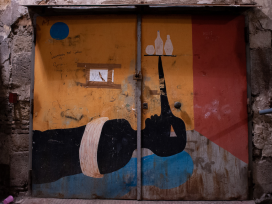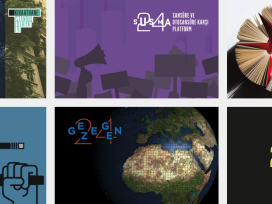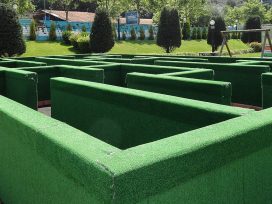
Roughly speaking, what percentage of your budget currently comes from sales and what percentage from and advertising? How do you deal with economic difficulties? Are you widening your field of activities beyond strictly publishing? Are you exploring new business models, lobbying cultural decision-makers, or appealing to the public?
Roughly half of our budget comes from sales and subscriptions, and half from advertising, although this is subject to change from time to time.
While journals in Europe continue their existence largely with the help of public support, this is not the case in Turkey. What should be done in Turkey to secure public support for art and literature journals?
I think it’s best if all journals are self-sufficient. Public support for journals in Europe is news to me. Although this does have its drawbacks, I think it’s impossible to avoid. The government could/should provide moral support rather than financial support. In essence, politics is responsible for opening up new fields and fostering morale rather than actively building things. For example, there could be more emphasis on literature courses in secondary schools and universities, and students encouraged to read journals. Some private schools are doing this already. One way to encourage students is to have poets and writers give lectures in schools. If the government were to recognize and honour men and women of literature, the youth could become more interested in this field. A very simple way to go about this is to have a writer or poet accompany a politician from the airport to his or her destination so that the politician learns about current issues in literature, or perhaps listens to a poem recited by this person. They could have public appearances with poets and writers. TV shows and series could make subtle changes to improve and elevate the “reader” image to create awareness. More importantly, being a reader could be transformed from being a “luxury” to an ordinary and normal state of being, creating the conviction that reading and being knowledgeable has significant social benefits. In essence, this society values people who read. This fact could be rediscovered. These could and should be the primary ways to build journal sales. I think the support of the people is more important than the direct public support.
What is your distribution and sales strategy? How do you take your journal to its readers?
The majority of our distribution is made through the Kültür Dergi Dagitim (KDD) Company. We send direct to some locations. But I can’t say that earnings are good. Sometimes we never receive money from sold copies.
Financing European cultural journals
Like other types of cultural organization reliant on public funds, cultural journals throughout Europe have felt the impact of recession. In addition to funding cuts, journals are also having to negotiate the upheavals taking place in the print sector.
Through a European survey of financing for cultural journals, Eurozine takes stock of the situation of the network, in order to communicate its experiences internally and to others who hold a stake in European cultural policy today. [more]
Read the statements here:
Varlik, Turkey
Ord&Bild and Glänta, Sweden
Vikerkaar, Estonia
Wespennest, Austria
Sodobnost, Slovenia
Host, Czech Republic
Res Publica Nowa, Poland
Mute, UK
Intellectum, Greece
Blätter für deutsche und internationale Politik, Germany
Journals tend to extend their publication intervals due to economic difficulties. How does this impact a journal’s communication with its readers?
I think the reader is less concerned with frequency and more with the weight of the journal. I don’t think journals will have problems with their readers as long as they keep to their usual frequencies. If it is inevitable to extend the interval, an attempt should be made to convince the reader of the necessity, otherwise it could lead to mixed feelings and negative response.
Do you have a website? How much of your content do you make accessible on it and what other uses does it serve? How do you make use of social media and what do you perceive to be its benefits?
We have a web site: edebiyatortami.blogspot.com. This has been online since 2008, when we started to publish the journal. Blogs are not enough, but they do have a practical side. Sometimes we post excerpts from the journal. We don’t make much use of social media.
Are you experiencing opportunities for synergy or co-operation between big and small media, or print and digital media, that previously did not exist?
I don’t understand the question about synergy between big and small media and I think it’s not that relevant.
How do changing readership habits brought on by digitization and Internet media effect circulation and sales? Is digitization bringing a change in the type of text that is submitted to your journal? Do you plan to adapt the journal’s content to changing readership preferences?
I don’t understand how the internet brings any reading habits. Has it really brought a reading habit? Could it be injecting a habit of consuming?
Are there political or literary polarizations between journals? If any, what should be the nature of contest between journals?
We should call this differentiation instead of polarization. Polarization will not take you anywhere, but diversity has a vast potential. A passion for and attention to diversity could increase quality of the journal. Political and literary diversity could sharpen awareness and increase attention. I think the greatest cul-de-sac is how journals try to be similar to each other. It is inexplicable how every writer can write in every magazine and editors simply don’t worry about this. If everyone can write anywhere, it will be impossible to understand who they are and where they stand. Poets and writers must know that they have no right to make journals mundane, and being commonplace is a step in that direction.
Do you think journals continue to be a school for aspiring writers and poets? In the past, writers and poets would usually publish their books after gaining acceptance by having their works published in journals; journals were stepping stones for young writers and poets, and would introduce important foreign writers to their readers before their books were translated. Has this situation changed? What is your opinion of writers who publish books after gaining popularity online?
I can’t remember anyone who gained acceptance in the world of literature after being popular online, but then again I might be wrong.
Journals are still schools, and the master-apprentice relationship still works. I still think one can’t be a writer or poet out of the blue. I’m not talking about a one-on-one relationship between a “master” writer and his apprentice; the “spectacle” no longer exists, but the truly talented ones know who and what to follow and draw their paths carefully. The masters are behind the curtains and the apprentices are conscious of their apprenticeship.
What responsibility does the bias and cultural inadequacy of mainstream media (daily newspapers and others) bring on journals? Are journals able to stand up to the task? What responsibilities do readers expect journals to undertake?
It is a fact that newspapers, with few exceptions, are losing interest in arts and literature. I don’t think this is related to what journals can do. Journals are already doing what they should. I don’t think there is a special category called the reader. All journals create (or should create) their own readership. Journals mind their own business and the readers theirs. Everyone has a sphere of responsibility and where these overlap, the journal and its readers are born.







